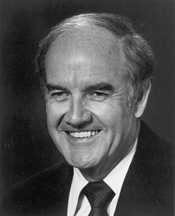1000 percent
1000 percent is a catchphrase in common use in the U.S. in the mid-20th century meaning extreme action or highly enthusiastic support.[1] For example, novelist Truman Capote wrote, "Prison is where she belongs. And my husband agrees one thousand percent."[2] Playwright Loring Mandel wrote, "Those coal people, those pinball people. I want them behind us a thousand percent."[3]
It was most famously used by Democratic Presidential candidate George McGovern in 1972. It backfired badly and became a byword for foolish and insincere exaggeration, and today is often used in irony or sarcasm.[4]
On July 25, 1972, just over two weeks after the 1972 Democratic Convention, McGovern's running mate, Thomas Eagleton, revealed that he had received electroshock therapy for clinical depression during the 1960s. McGovern had been running an emotional crusade against incumbent President Richard Nixon; the Republicans counterattacked by suggesting that McGovern was crazy, so the evidence that his running mate had secretly undergone psychiatric treatment three times for mental illness destroyed the McGovern strategy. Eagleton was hospitalized in 1960 for four weeks for "exhaustion and fatigue." He was hospitalized for four days at the Mayo Clinic in 1964, and for three weeks in 1966. He twice underwent electroshock therapy for depression.[5] Influential Democrats questioned Eagleton's ability to handle the office of Vice President, and McGovern's competence in choosing top officials. In response to initial, daily pressure from the media and party leaders that Eagleton be replaced, McGovern announced that he was "1000 percent behind Tom Eagleton, and I have no intention of dropping him from the ticket."[6]
McGovern subsequently consulted confidentially with preeminent psychiatrists, including Eagleton's own doctors, who advised him that a recurrence of Eagleton's depression was possible and could endanger the country should Eagleton become president. Consequently, on July 31, McGovern announced that he had reversed his position "in the interest of the nation", and Eagleton announced that he was withdrawing his candidacy to prevent continued diversion from greater issues, and for the sake of party unity.[7][8][9][10][11]
Six prominent Democrats turned down McGovern's offer to replace Eagleton as his running mate: Ted Kennedy, Edmund Muskie, Hubert Humphrey, Abraham Ribicoff, Larry O'Brien and Reubin Askew. Sargent Shriver, former Ambassador to France and former Director of the Peace Corps, later accepted the nomination.[12] McGovern went on to lose the general election by one of the largest landslides in history.
References
- ↑ Eric Partridge, Tom Dalzell, and Terry Victor. The New Partridge Dictionary of Slang and Unconventional English: J-Z (2006) p. 1954
- ↑ Truman Capote, Breakfast at Tiffany's: a short novel and three stories (1958) p. 95
- ↑ Loring Mandel, Advise and consent (1959) Page 59
- ↑ William Safire, Safire's New Political Dictionary (1993) pp 796-7
- ↑ Time, Aug. 7, 1972
- ↑ White (1973), pp. 213
- ↑ McGovern, George S., Grassroots: The Autobiography of George McGovern, New York: Random House, 1977, pp. 214-215
- ↑ McGovern, George S., Terry: My Daughter's Life-and-Death Struggle with Alcoholism, New York: Random House, 1996, pp. 97
- ↑ Marano, Richard Michael, Vote Your Conscience: The Last Campaign of George McGovern, Praeger Publishers, 2003, pp. 7
- ↑ The Washington Post, "George McGovern & the Coldest Plunge", Paul Hendrickson, September 28, 1983
- ↑ The New York Times, "'Trashing' Candidates" (op-ed), George McGovern, May 11, 1983
- ↑ Liebovich, Louis (2003). Richard Nixon, Watergate, and the Press: A Historical Retrospective. Greenwood Publishing Group. p. 53. ISBN 9780275979157.
Bibliography
- Marano, Richard Michael, Vote Your Conscience: The Last Campaign of George McGovern, Praeger Publishers, 2003, pp. 7
- McGovern, George S., Grassroots: The Autobiography of George McGovern, New York: Random House, 1977, pp. 214-215
- McGovern, George S., Terry: My Daughter's Life-and-Death Struggle with Alcoholism, New York: Random House, 1996, pp. 97
- The New York Times, "'Trashing' Candidates" (op-ed) by George McGovern, May 11, 1983
- Presidential Studies Quarterly, "The Eagleton Affair: Thomas Eagleton, George McGovern, and the 1972 Vice Presidential Nomination", James N. Giglio, Dec. 2009, Vol. 39 Issue 4, pp. 647–676
- Time, "McGovern's First Crisis: The Eagleton Affair", August 7, 1972 (cover story)
- Time, "George McGovern Finally Finds a Veep", August 14, 1972 (cover story)
- The Washington Post, "George McGovern & the Coldest Plunge", Paul Hendrickson, September 28, 1983
- White, Theodore H., The Making of the President, 1972 (1973)
| ||||||||||||||||||||||||||||||
